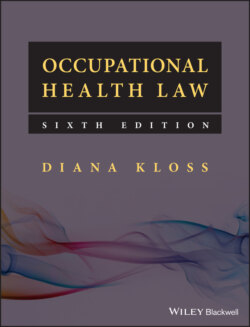Читать книгу Occupational Health Law - Diana Kloss - Страница 61
2.12 Professional indemnity
ОглавлениеThose who work for others rather than themselves often assume that any legal liability falls on the employer alone. This is definitely not the law. The primary liability for negligence lies with the person who commits the negligent act. Sometimes there is no alternative defendant. An independent consultant is the only possible defendant if he makes a careless mistake. If he is in partnership, his partners are also liable. Where the health professional is an employee, the employer is vicariously liable: they are both responsible. If the employer is in financial difficulty and uninsured, or claims a contribution or indemnity from the employee, or where the claimant out of revenge chooses to pursue the employee instead of or as well as the employer, damages and costs may threaten. The OH professional may be involved in a HSWA prosecution in which he may need legal advice and representation (it is not possible to insure against a criminal fine). For these reasons, every professional should be covered by professional liability insurance, despite the lack of a legal obligation to insure, and the guidance of the regulators is that they have an ethical duty to do so. In the past, nursing staff commonly insured through membership of the Royal College of Nursing (RCN) or a trade union. After the RCN in 2014 withdrew cover for its members who are directly employed and therefore included in their employer’s insurance, nurses were advised to check whether they were protected through an employer’s insurance or whether, if they were in the position of an independent contractor, they needed to take out and pay for their own professional liability insurance. Doctors usually obtain professional indemnity through a subscription to the Medical Defence Union or the Medical Protection Society. The latter are not, strictly speaking, insurance companies, because they have a discretion whether to indemnify (Medical Defence Union v. Department of Trade (1979)). In 2019 a Clinical Negligence Scheme for General Practice was introduced in England and Wales providing indemnity for all staff working in NHS General Practice. The Faculty of Occupational Medicine advises that in his own interest and that of his patients, the doctor should obtain adequate insurance or professional indemnity cover for any part of his practice not covered by an employer’s indemnity scheme.
Nurses are often troubled that they are not covered if they undertake ‘extended role’ tasks without proper authority. Because essentially the proper role of a nurse rests on custom and practice, it is impossible to lay down a definitive list of nursing tasks. The RCN in its guidance notes for the occupational health nurse advised that each OH department should draw up an agreement about the tasks which the nurse is expected to perform. No nurse should undertake any procedure for which she is not trained and competent. The RCN was reluctant to draw up lists of duties which could be regarded as a restriction on the development of the OH nurse’s role in a true professional sense. On the other hand, OH nurses need to recognise those areas of expertise which rightly belong to other professions, such as medicine, radiography or physiotherapy. The emphasis is on demarcation agreements, especially with doctors who carry the ultimate clinical responsibility, and on training to enable the nurse to extend her role competently.
